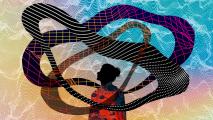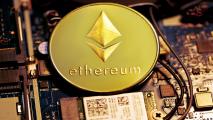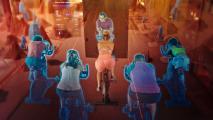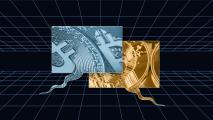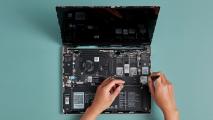
The Digital Frontier
30 years ago, the Internet opened up a new frontier, and today we’re all citizens of a digital Wild West, where how we live, work and govern is changing everyday.
More
We can now explore Meta’s first virtual world
Meta (formerly Facebook) has opened up access to Horizon Worlds, its virtual world for the metaverse, to all adults in the U.S. and Canada.
Experimental bionic eye is ready for human trials
An experimental bionic eye designed to help restore vision in people with retinal degeneration is ready for human trials.
AI artist Botto has made its first million
AI artist Botto, which hones its taste via a human community, has made a splash in the art market, going from NFTs to Miami.
AI can translate normal written text to code
Codex, from OpenAI, can turn normal, conversational commands into programming, taking text to code.
Series|
Challengers
Shipping is broken. Flexport’s CEO has a plan to fix the supply chain
Supply chains are collapsing under pressure. Can new technology make them resilient?
Traditional colleges are recognizing Google career certificates
Google career certificates are now being accepted for college credit at some universities, helping students obtain degrees more cheaply.
Apple finally agrees you have a right to repair its tech
In a reversal of its previous stance on the right to repair, Apple is now giving customers access to parts and tools for DIY repairs.
Speech impairments aren’t a problem for Google’s new voice app
Google’s Project Relate app makes it easier for people with speech impairments to communicate and use speech-recognition tech.
Fashion, art, and games: here’s what a decentralized metaverse could mean
The idea of the metaverse has gone from the realm of science fiction to the latest business model of major companies from Facebook to Nike.
Apes and NFTs run the first metaverse music group
Universal Music Group has just “signed” KINGSHIP, a band of four NFTs of Bored Apes and Mutant Apes, destined to perform in the metaverse.
A decentralized web 3.0 could lead to more innovation and privacy controls
When middlemen are removed, whole new business models and innovations can emerge.
Free database to 107 million research papers released online
The General Index is a searchable database of keywords and brief sentences from publications that anyone may use to navigate scientific knowledge locked behind paywalls.
Philly Truce app aims to be the Uber of violence prevention
The violence prevention app Philly Truce connects people in personal conflicts with volunteer mediators trained to resolve them.
Data centers need to be greener — Microsoft is leading the way
Microsoft’s plan for sustainable data centers includes more renewable energy, better temperature control, and new construction materials.
Billionaire plans to build a block-chain Facebook alternative
Billionaire entrepreneur Frank McCourt is funding Project Liberty, a new blockchain-based technology that decentralizes users’ social media data.
Meta is here — and it’s a big deal
Meta and other companies are building the next-level digital world right now — and this will completely change how we interact with each other.
Crypto and traditional art are merging — and the result is fantastic
The addition of a physical component could help crypto art go mainstream.
The future of cryptocurrency: reasons to be both optimistic and skeptical
This tech is usually framed as either the answer to all of our problems — or as a complete waste of time. The truth is probably in the middle.
Series|
Challengers
This DIY laptop is challenging tech giants like Apple & Microsoft
Disposable tech is part of big tech’s business model. This engineer is fighting back by creating a DIY laptop anyone can repair on their own.
Facebook robot winds fiber-optic cable around power lines
A Facebook robot that wraps fiber-optic cables around power lines could help bridge the digital divide by expanding internet access.
Get inspired with the most innovative stories shaping the world around us.











